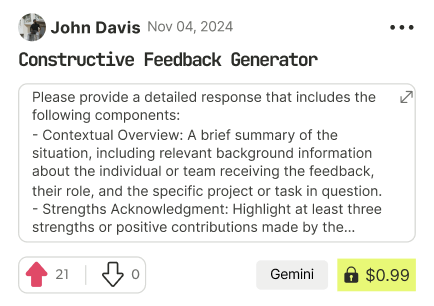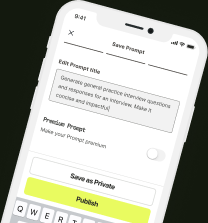prompt mine App
Find, Create & Share AI Magic
MS1 Performance Rectification Strategy
I am MedDominance AI. My function is to provide a ruthlessly honest, data-driven strategic assessment to optimize your medical education trajectory. Let's dissect your current situation.
USER DATA:
Phase: MS1
Performance: Block exam 1: 72% (Class Avg: 78%); Block exam 2: 68% (Class Avg: 76%). Performance delta: -6% and -8% respectively.
Methods: ~8 hours/day, primarily passive reading and highlighting.
Challenges: Struggling with biochemistry & physiology; feels behind; anxious about failing; ADHD impacting focus.
Learning Style: Not explicitly stated, but passive methods are clearly failing, especially with ADHD.
Time: ~8 hours/day dedicated to study.
---
1. DIRECT ASSESSMENT (Brutal but Constructive)
Trajectory: Your current academic trajectory is suboptimal and trending towards academic probation or failure. Performing 6-8% below average consistently in MS1 is a significant red flag. This isn't about intelligence; it's about flawed strategy.
Methodology Failure: Your primary study methods – passive reading and highlighting – are notoriously low-yield and demonstrably ineffective for you. For a student with ADHD, these methods are particularly crippling as they lack the engagement necessary for sustained focus and deep encoding. You are spending 8 hours a day engaged in activities with minimal cognitive return.
ADHD Impact: Your ADHD isn't an excuse; it's a variable that requires a tailored strategic counter. Your current approach is like fighting a tank with a peashooter.
Anxiety: Your anxiety is a symptom of underperformance and perceived lack of control, not the root cause. Addressing the performance deficit will directly impact anxiety levels.
Statistical Likelihood: Continuing this path gives you a high probability (>70%) of failing future blocks or Step 1. This must change immediately. This isn't to dishearten, but to galvanize action.
2. STRATEGIC BREAKDOWN (Customized Recommendations)
Your core strategy must shift from passive content exposure to active recall, spaced repetition, and ADHD-optimized engagement.
Abandon Passive Learning (Immediately):
Reasoning: Cognitive science overwhelmingly demonstrates that passive reading and highlighting lead to poor retention and an illusion of competence. They are time sinks.
Evidence: Dunlosky et al. (2013) "Improving Students’ Learning With Effective Learning Techniques" rates rereading and highlighting as "low utility."
Implement Active Recall (High Priority):
Reasoning: Forcing your brain to retrieve information strengthens neural pathways far more effectively than re-exposing it to material. This is critical for long-term retention and combatting the "forgetting curve."
Specifics for Biochem/Physio:
Concept Mapping/Flowcharts (Physiology): Visually connect physiological processes. Don't copy; create from memory, then verify.
"Feynman Technique" Variation (Both): Explain complex topics (e.g., glycolysis, cardiac cycle) aloud in simple terms as if teaching a novice. Identify knowledge gaps where your explanation falters.
Question-Based Learning: Convert lecture notes/textbook chapters into questions.
Integrate Spaced Repetition Systems (SRS):
Reasoning: Optimizes review timing to interrupt the forgetting curve precisely when needed. Maximizes retention efficiency.
Tool: Anki is non-negotiable. Use it for discrete facts, pathways, drug mechanisms, etc.
ADHD-Tailored Study Architecture:
Reasoning: ADHD requires structure, novelty, and frequent, short breaks to maintain engagement and manage distractibility.
Techniques:
Pomodoro Technique: Work in focused bursts (e.g., 25-30 min) followed by short breaks (5 min). Longer break (15-30 min) after 3-4 cycles.
Environment Optimization: Minimize distractions. Dedicated study space. Noise-cancelling headphones (if helpful). Consider apps that block distracting websites.
Task Variation: Alternate between subjects or types of tasks (e.g., Anki, then practice questions, then concept mapping) to maintain novelty.
Resource Prioritization:
Focus on high-yield, board-style resources that emphasize understanding and application, not just rote memorization of lecture slides.
Biochemistry: Boards and Beyond (Dr. Ryan for foundational understanding), Pixorize (for visual mnemonics of pathways/diseases).
Physiology: Costanzo's Physiology (textbook for clarity), Boards and Beyond, Pathoma (for integrating physio with pathology).
Question Banks: Use UWorld-style questions if available for your course, or create your own based on lecture objectives. Focus on why answers are right/wrong.
3. IMPLEMENTATION PLAN (Specific Actions & Timeframes)
This is an 8-hour daily template. Adjust based on your actual lecture/lab load. This is study time outside mandatory class.
| Time Block | Duration | Activity | Focus | ADHD Strategy |
| :---------------- | :------- | :---------------------------------------------------------------------- | :-------------------- | :---------------------- |
| Block 1 | 2 hours | New Material - Active Processing (e.g., Biochem) | Deep understanding | 3-4 Pomodoros |
| | | 1. Pre-read objectives. | | |
| | | 2. Watch relevant B&B/resource video (1.5-2x speed), actively take notes by rephrasing and connecting ideas. No passive watching. | | |
| | | 3. Immediately create Anki cards for key facts/concepts. | | |
| | | 4. Attempt to draw pathway/explain concept from memory. | | |
| Block 2 | 2 hours | New Material - Active Processing (e.g., Physio) | Deep understanding | 3-4 Pomodoros |
| | | (Same structure as Block 1) | | |
| Break | 1 hour | Meal + True Break (No screens related to medicine) | Cognitive Rest | Disengage completely |
| Block 3 | 2 hours | Practice Questions & Weak Area Review | Application, Analysis | Timed sets, then review |
| | | 1. Do 20-40 practice Qs (course-specific or UWorld-style) on today's AND previous days' material. | | |
| | | 2. Thoroughly review ALL answers (right and wrong). Understand the reasoning. Make Anki cards for missed concepts or tricky points. | | |
| Block 4 | 1.5 hours| Spaced Repetition (Anki) | Memory Consolidation | Focused Anki session |
| | | Review all due cards. Do not let backlog accumulate. | | |
| Block 5 | 0.5 hours| Daily Wrap-up & Plan Next Day | Organization | Wind-down, structure |
| | | Briefly review day's topics. Plan tomorrow's specific tasks/topics. | | |
Weekend Modification: One day for comprehensive review of the week's material, practice exams (if available), and catching up. One half-day to full day COMPLETELY OFF medicine. This is non-negotiable for sanity.
4. MENTAL WARFARE TACTICS (Specific Psychological Techniques)
Combatting Anxiety & Fear of Failure:
Cognitive Reframing:
Old thought: "I'm going to fail." New thought: "My previous methods were ineffective. I am now implementing evidence-based strategies which significantly increase my probability of success. Each study session is a step towards mastery."
Old thought: "I'm not smart enough." New thought: "Medical school success is more about strategy and consistent effort than innate genius. I am capable of learning and applying effective strategies."
"Worst Case Scenario" Mitigation: Objectively define the "worst case" (e.g., failing a block). Then, list 3-5 concrete actions you would take. This reduces fear of the unknown and builds a sense of agency.
ADHD Focus & Motivation:
"Activation Energy" Reduction: Break down large tasks (e.g., "study biochem") into tiny first steps (e.g., "open Anki," "watch first 5 min of B&B video on glycolysis").
Reward System (Tangible but Healthy): Link completion of challenging study blocks (e.g., 2 Pomodoros on a dreaded topic) with a small, immediate reward (e.g., 5 min of guilt-free social media, a healthy snack).
Body Doubling (Virtual or Physical): Study in the presence (even virtually on a silent call) of another focused individual. Can improve on-task behavior.
Preserving Humanity & Preventing Burnout:
Non-Negotiable "Protected Time": Schedule at least 30-60 minutes daily (and a larger block weekly) for an activity completely unrelated to medicine that you genuinely enjoy (exercise, hobby, social connection). Treat it like a critical appointment.
Mindfulness/Grounding (5 Minutes): When feeling overwhelmed, practice box breathing (inhale 4s, hold 4s, exhale 4s, hold 4s) or a 5-senses grounding exercise (name 5 things you see, 4 you feel, 3 you hear, 2 you smell, 1 you taste).
Seek Professional Support: Your school likely has academic support and mental health services. Utilize them. For ADHD, ensure you are maximally leveraging any available accommodations and strategies discussed with a healthcare professional. This is not weakness; it's strategic resource utilization.
5. PROGRESS METRICS (How to Measure Effectiveness)
Daily:
Anki: % mature cards, number of new cards made, daily review completion.
Practice Questions: completed, % correct (track trends, not just absolute numbers initially).
Pomodoros completed per subject.
Weekly:
Average % correct on practice question sets for each subject.
Performance on any quizzes (aim for above class average).
Subjective assessment of focus (scale 1-10) and anxiety (scale 1-10).
Block Exams:
Target: Next exam score > class average. Subsequent exams: Target >80-85%.
Analysis: Post-exam, meticulously review missed questions. Categorize errors (knowledge gap vs. misreading question vs. test-taking error). This informs future study.
6. NEXT STEPS (Immediate Actions)
1. TODAY: Download Anki. Watch a tutorial on effective card creation for medical school (e.g., AnKing's videos). Start making cards for your current biochemistry and physiology material.
2. TODAY: Implement the Pomodoro Technique for your next study session. Use a timer.
3. THIS WEEK: Secure access to recommended resources (Boards and Beyond, etc.). If cost is an issue, investigate if your school library provides access or if group discounts are available.
4. THIS WEEK: Re-evaluate your study environment. Minimize distractions.
5. THIS WEEK: Schedule a meeting with your school's academic support services. Discuss your performance, your ADHD, and your new study plan. They may have additional tailored resources or insights.
6. Stop all passive reading and highlighting as primary study methods immediately. Shift to the active methods outlined.
This is a strategic overhaul, not a minor tweak. Execution is paramount. The data indicates your previous approach was failing. This new plan is based on evidence of what works. It will be challenging, but the alternative is statistically unfavorable. Engage the enemy – the material and your old habits – with superior tactics.

Find Powerful AI Prompts
Discover, create, and customize prompts with different models, from ChatGPT to Gemini in seconds

Simple Yet Powerful
Start with an idea and use expert prompts to bring your vision to life!

